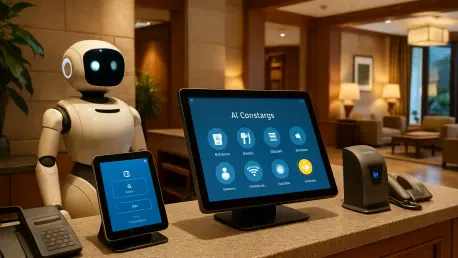In an era where technology is reshaping industries at an unprecedented pace, the hospitality sector stands at a pivotal juncture with artificial intelligence (AI) at its core. The hospitality industry’s exploration into AI integration presents a mix of promise and challenge, signaling a transformative journey. While many players in the field show increasing interest in AI, significant gaps remain in their ability to fully harness its potential due to issues related to integration readiness and workforce training. Larger hotel chains, despite being focused on system consolidation, have relegated AI investment as a secondary priority. In contrast, smaller independent hotels are more agile, expanding their teams and experimenting with innovative technologies.
Central Theme and Core Questions
The central theme of this research delves into AI’s transformative role in the hospitality industry’s commercial sphere, questioning its potential as a catalyst for change. Central to this exploration are key inquiries about the gap between technological potential and operational readiness, the industry’s readiness for AI-driven evolution, and how AI adoption can be harmonized with existing systems to enhance overall efficacy. The research also seeks to understand the prioritization of AI investments compared to other technological advancements within the industry. Moreover, it evaluates how hotels of varying sizes and resources adapt to AI, offering a glimpse into the industry’s evolving landscape amid accelerating digital transformation.
Background and Context
The research emerges against a backdrop of technological flux, as hospitality grapples with AI’s implications across marketing, distribution, and revenue management. The deposition of AI into these core functions reflects a broader movement toward technological integration, which is vital for maintaining competitive edge and innovation. This exploration is crucial at this juncture because failing to evolve with technological advancements may lead to inefficiencies and lost opportunities. Notably, the broader relevance of this study extends to society, where customer expectations and service standards are continually rising, demanding personalized and streamlined experiences that AI is uniquely positioned to deliver. The industry’s evolution underscores a societal shift toward data-driven solutions and cross-functional collaborations, aiming to create more responsive and resilient business models.
Research Methodology, Findings, and Implications
Methodology
The research methodology was comprehensive, drawing from various data collection techniques and analytical tools to examine how hotels integrate AI into their operations. The study compiled insights from over 700 hotel brands, leveraging data from 21,000 properties across 310 cities, facilitating a broad understanding of the industry landscape. Techniques such as surveys, interviews, and analysis of operational data were pivotal in collecting valuable insights. By focusing on revenue management, marketing, and distribution functions, the study systematically explored how collaboration is being reshaped through AI integration, revealing trends and gaps in the industry’s approach to technological evolution.
Findings
Key findings from the research highlight a growing disparity between AI’s technological potential and its current operational deployment within the hospitality sector. While AI interest is increasing, for many, this remains a secondary priority, particularly among large hotel chains more focused on consolidating existing systems. On the other hand, smaller hotels appear more dynamic, expanding their teams and testing new technologies. A significant portion of hotels continue to dedicate considerable time to manual reporting tasks, emphasizing a need for improved data connectivity and streamlined distribution functions. There exists an evident need to bridge the gap between technology potential and readiness for integration, underscoring the importance of further investment in human capital.
Implications
The findings have substantial implications for the hospitality industry, suggesting paths toward enhanced technological adoption and operational efficacy. Practically, the results indicate that success in integrating AI demands more than interest; it requires prepared teams with the capability to adapt to new systems. Theoretically, the study underscores the importance of fostering a technologically literate workforce alongside system advancements. Societal implications highlight an urgent call for hospitality entities to meet the evolving demands of consumers seeking personalized experiences. The advancement also spells a shift toward collaborative, multidisciplinary approaches, essential for leveraging AI’s potential fully to drive innovation and efficiency within hospitality.
Reflection and Future Directions
Reflection
Upon reflecting on the research process and discoveries, challenges such as disparity in technological adoption and integration stood out. Overcoming these hurdles required thorough analysis and highlighting the distinct paths larger and smaller hotels are taking. Adequate training and readiness emerged as pivotal, aligning with the broader context of technological evolution. The research, while expansive, could have further explored region-specific dynamics and deepened insights into institutional restructuring necessary for AI implementation. Balancing technological and human elements presents a nuanced challenge that necessitates adaptive strategies and investment in skill development to mitigate operational readiness gaps.
Future Directions
Future research could expand by exploring the nuances of AI’s impact on specific hotel operations beyond marketing and distribution, such as guest services and customer relationship management. Investigating regional challenges and successes in AI integration could provide localized insights, aiding global adaptation strategies. Research might also delve into long-term career impacts for hospitality professionals amid AI’s rising role, offering guidance on workforce development tailored to evolving industry needs. Uncovering the latency in technology adoption due to organizational or cultural barriers provides a fertile ground for further examination, helping to chart a roadmap for seamless AI transition.
Conclusion and Final Thoughts
The research underscored AI’s substantial yet uneven impact on the hospitality industry, illustrating a landscape of emerging challenges and opportunities. The findings highlighted the need for strategic investment in both technology and human capital to bridge readiness gaps and better leverage AI’s potential. As the sector continues to evolve, there remains an imperative to prioritize seamless integration and workforce training. Future directions signal a promising trajectory of technological evolution, where hotel entities can redefine service paradigms and achieve competitive advantage by embracing AI as a core component of their strategic frameworks. Exploring these possibilities further can continue to refine approaches, ensuring sustainable and innovative growth within the dynamic hospitality sector.









